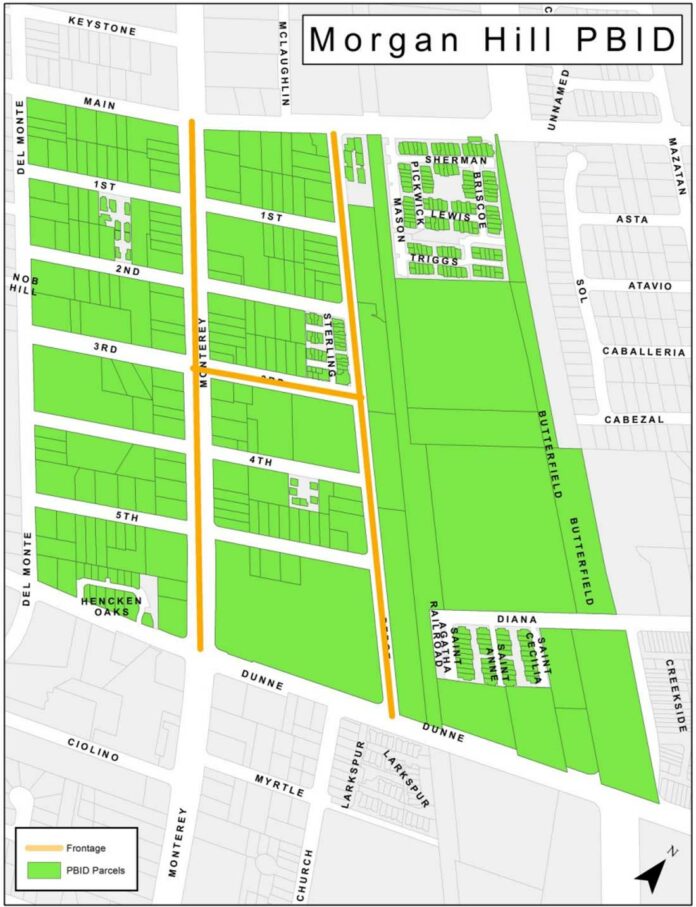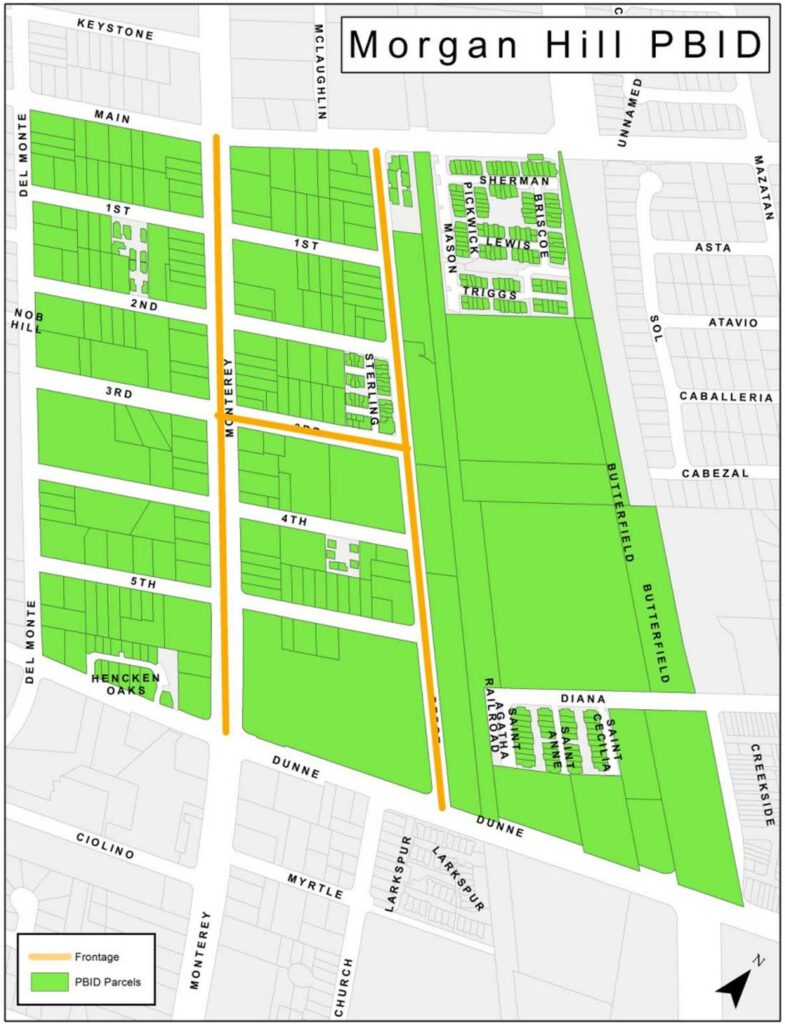
A majority of downtown Morgan Hill’s commercial property owners recently voted to add a new parcel tax to their annual bills, with the revenue going directly to improvements and programs that benefit the neighborhood.
Known as the Morgan Hill Property and Business Improvement District (MHPBID), the program will start collecting the new assessments from the 59 owners of 98 downtown commercial properties in early 2024, according to Morgan Hill Economic Development Manager Matt Mahood. The PBID assessment will appear as a separate line item on the property owners’ tax bills starting in late 2023.
There are more than 100 PBIDs in California, and Morgan Hill’s downtown had such a program from 2006-2013. City officials have sought to bring back the downtown PBID since it was identified as a priority in City Hall’s Economic Development Blueprint in 2017, and have been going through the public review process for the new assessment district for about six months.
The projected first-year budget for the new MHPBID is about $282,000. The revenues serve as a supplement to existing tax funds and can be spent on things like street and sidewalk cleaning, safety measures, capital improvements, art installations and special events within the district—which is bound by Dunne Avenue, Del Monte Avenue, Main Avenue and Butterfield Boulevard. The revenues also pay for the administration of the MHPBID, which is operated by an “owners association” governed by a board of directors.
“This is a significant milestone,” Mahood said of the return of the MHPBID. “It really shows the maturity of our downtown and the city’s commitment to making the downtown a great place for our residents and visitors.”
The new PBID was approved at the Nov. 16 Morgan Hill City Council meeting, with a vote tally of 18 property owners in favor and 16 against. City officials said the vote was “weighted” with the votes cast by larger property owners (paying higher projected assessments) counting more. Only 36 of 59 commercial downtown property owners submitted ballots, two of which did not count because they were not signed or did not indicate a choice, City Clerk Michelle Bigelow said.
Upon hearing the property owners’ vote count, the council voted 4-1 to approve the MHPBID. Council member Rene Spring voted against the program.
Mahood noted that the majority of the largest property owners in the downtown district were supportive of the PBID.
Several of the supportive downtown property owners spoke or emailed the council urging the body to approve the PBID program at the Nov. 16 meeting.
“A PBID is one of the best tools a city and community can use to keep a community clean and safe,” said Michael Van Every of Republic Urban Properties, which developed the Sunsweet project on East Third Street in downtown Morgan Hill. “It is not a drain on city services (and) it provides an additional resource for the city.”
He noted that the PBID will help maintain “things we take for granted” like clean streets and landscaping areas, which are otherwise “expensive to maintain.”
Each property’s PBID assessment is based on the type of parcel (with nonprofits paying at a reduced rate), property square footage and, in some cases, their linear frontage on busy commercial streets such as Monterey Road or Depot Street, according to city staff.
Residential properties do not pay a PBID assessment. The City of Morgan Hill is required by state law to pay a PBID assessment on any properties it owns in the district that have a commercial value, Mahood said. These include the downtown parking garage, Community and Cultural Center and public parking lots. The county’s Morgan Hill Courthouse and VTA’s Caltrain parking lot on Butterfield Boulevard are also required to pay an annual assessment under the PBID.
The city’s estimated total assessment payment into the MHPBID for 2024 is about $108,000, which will be paid from the general fund, Mahood said.

The new MHPBID has a five-year lifespan from its official start date, which is expected to be Jan. 1, 2024 or shortly after, according to city staff. It will be formed as a 501(c)(6) not-for-profit organization.
The property owners who are subject to the PBID assessments can vote to renew the program after five years.
The PBID owners association board must hold between five and nine directors, according to the program’s local rules. At least three of those must be property owners within the district, two must be city staff members with the remainder representing “a combination of property owners, business owners or community residents within the district,” says a city staff report.
Seven people have so far been tapped for the MHPBID board: city staff members Mahood and Public Works Director Chris Ghione, as well as downtown property owners Dan McCranie (Ladera Grill and Edes Gallery), Frank Leal (Granada Theater and Hotel MOHI, among other properties), Rosie Bergin (Rosy’s At The Beach restaurant), Eric Wallace (CDC Insurance) and Honnie Murphy (Murphy’s Mercantile and other properties).
Mahood said the remaining two seats on the board will be filled by a vote of these board members shortly after the program is fully in place.
The MHPBID owners association is subject to oversight by the city council.
At the Nov. 16 meeting, Spring said he was opposed to the new MHPBID because he thinks it is a “flawed” program. He said the city has already spent significant sums on the downtown, and other areas of Morgan Hill deserve more focus for improvement.
The city council terminated the previous downtown PBID in 2013 due to a lapse in the program’s tax-exempt status, according to city staff. That district had about $106,000 in the bank when it was dissolved, and the sum will be administered by the new MHPBID’s board.








Rene Spring was right. It is another flawed program and a bad use of taxpayers dollars when there are so many higher priorities. Residents are the largest downtown property owners and WE now get to pay the most out of money the City doesn’t have. When they come asking you to pay higher personal taxes for critical services, ask why they decided to spend more for twinkle lights instead.